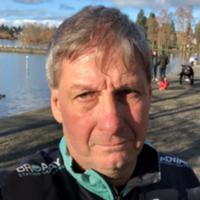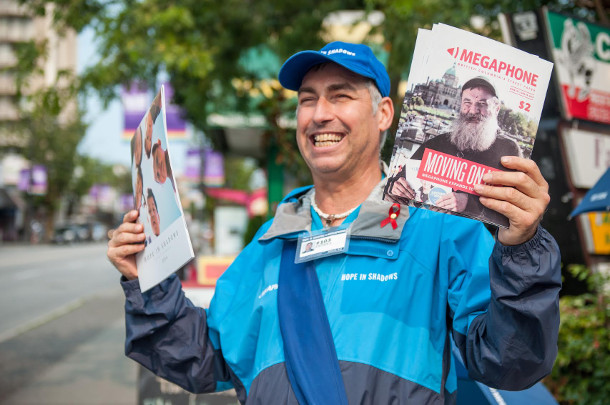It was early afternoon last Friday and Stephen Scott had a wide grin. He'd just spent close to an hour setting up shop on a corner in Vancouver's West End where he sells Megaphone Magazine, the monthly newspaper sold by low-income vendors in need of extra money. In this pre-Christmas period, Stephen was also selling the annual Hope in Shadows calendar, which features photographs of life in the Downtown Eastside, taken by people who live there.
Stephen wore a blue Hope in Shadows Gore-Tex jacket and a rainbow-coloured toque with a monkey face. He'd brought a table, a chair, Christmas lights and an umbrella to protect against the December drizzle. There was also a stuffed koala bear, a plushy talisman for the gregarious 45-year-old's happy reversal of fortune.
"Some people give me change and I put it in this can, which goes to my dream -- to go to Australia and hold a real koala bear. It's been my dream since I was a child."
Stephen, now 45, has yet to live that koala dream. But he is living a joyous, meaningful life -- one, which only five or six years ago, he could only have imagined in his dreams.
During his 30s, Stephen ended up drug addicted and homeless in Vancouver after two nearly fatal accidents. He had also been diagnosed with HIV infection and brain cancer. These days Stephen lives in social housing by Jericho Beach with his partner, Adam. He's been drug free for five years.
"I go walk in Jericho Park all the time. On the beach all the time, barbecue all the time. I can have a life now. To live there has really saved me."
The money Stephen (pronounced as the Gallic Stephane) has made from his sales on the northeast corner of Davie and Thurlow streets over the past three to four years has helped pay his food bills. His monthly $1,000 disability pension from the provincial government only goes so far when he is also paying $800 on rent. He and other vendors buy Megaphone Magazine for 75 cents a copy and sell it for $2. He buys the Hope in Shadows calendar for $10 and sells it for $20.
But this little patch of ground on Davie Street has also given him what many disadvantaged people in the city seek but often never find -- the solace of human connection.
"Bonjour, bonjour!" said the Quebec native to two familiar faces who approached him last week. Stephen pulled out the latest issue of Megaphone Magazine and flipped to one page. "Here, I'm inside the magazine. You recognize this face? It's me. It's a special issue for December. They put all the vendors in."
One of the men, who declined to give his name, said Stephen had become a regular and welcomed fixture in the local community. "He's a very popular guy. He's been here about four years." Stephen suggests it's only been three years. "Oh, it seems longer, Steph," says his friend.
Stephen said his Megaphone gig in the West End has been central to his recovery from drugs and depression.
"I have good supportive people here, loyal people who support me every month and buy a copy of Megaphone and share stories. It's amazing. And now I have a reason to be happy and nothing will make me go back to that road again."
Over the years Stephen has kept track of the names of each person who buys a copy of Megaphone or the Hope in Shadows calendar. There are 260 people on his list now. He gets his customers to write down their names and he gives them a card of thanks with his photo inside. Together the people he's encountered on Davie Street have formed a web of support Stephen had almost given up on finding.
Stephen grew up in a prosperous farming family in Saint-Hyacinthe, near Montreal. When he turned 16, Stephen got his first car, a blue four-door Pontiac, and moved to Montreal. He studied in college and eventually became a commercial photographer. He helped would-be fashion models build up their portfolios.
But Stephen, who is bilingual, longed to return to British Columbia where he had earlier tree-planted to pay for his schooling. "I really liked the mountains and the ocean. It was the most beautiful setting I'd seen in my life."
'A few weeks to live'
In the early '90s Stephen moved to Vancouver and started a janitorial business. In 2000, he decided to drive back to Quebec to celebrate the arrival of the new millennium with his family.
Thirty kilometres from his hometown, Stephen fell asleep at the wheel. The car crashed into a ditch and Stephen was in a coma for two months. "My car was ruined and I was ruined myself," he recalls. "I had to relearn everything. I was like a baby because I was paralyzed on the right side and lost my voice. I had to learn how to walk and talk again. It took me two years to get back on my feet."
Stephen said he also became infected with HIV due to blood transfusions he received during his treatment.
But he recovered well enough to return in 2002 to B.C. One day he ventured into Whistler's high alpine on a snowboard. Stephen found himself alone, with zero visibility due to heavy fog. He fell off a cliff and had to be removed by helicopter. His injuries were traumatic and again he lapsed into a coma that lasted several months. He was transferred to Montreal where he faced a long recovery.
During that period Stephen was given a CT scan that revealed he had brain cancer. "The doctors said that I had a few months to live. I didn't want my family to see me dying. So I decided to come back to Vancouver. A friend bought me a plane ticket because I felt I wanted to die in Vancouver."
Stephen didn't die after returning to Vancouver in 2004 and he credits support he received at the Rainbow Community Church, a gay church in the West End, for his reprieve from cancer. "They said that I had two months to live in 2004. But I am alive today. It's a miracle."
But despite his survival, Stephen was a changed man in the years following his snowboarding accident. He was partially paralyzed on his right side. He was unable to do many physical tasks that involved balance. He struggled with his short-term memory.
Finding work proved difficult and soon he was running out of money. Stephen became homeless, living on or near Granville Street, sleeping on cardboard.
Eventually, some people took him to a shelter and arranged for welfare support from the provincial social services ministry. Stephen began living in Downtown Eastside single-occupancy room hotel but found little relief. "There were bedbugs, cockroaches. It was terrible, all the drug use. Nobody was helping me at all. I tried to make friends but everybody wanted me to do drugs."
Stephen turned increasingly to sex work to fund his drug habit. He battled substance abuse and homelessness for about six years. His life began to turn around after he began attending workshops run by PEERS Vancouver Research Society, which helps sex workers take control of their lives and learn job skills. He became reunited at the PEERS sessions with a former boyfriend, Adam, a Cree man from Saskatchewan, who had been living in a rooming house in Burnaby. Stephen and Adam had dated in Vancouver during the '90s.
"We had lost track of each other for a good 15 years, until I took the PEERS support program. He was also taking the course," says Stephen. "I didn't recognize him but he recognized me. It was a very good turning point, for sure. Because all the people who I had been meeting, were all the wrong people in my life. They brought drugs and stuff like that."
New family, new hope
It was also at PEERS that someone connected with Megaphone Magazine gave Stephen a disposable camera and urged him to take photographs that could be chosen for the next Hope in Shadows calendar. He won honours in the contest for a photo he took of a mirror in a beauty salon on Cordova Street. "It was an antique gold-framed mirror."
The photo contest led Stephen in 2011 to begin selling Megaphone Magazine and the Hope in Shadows calendar. In 2014 Stephen was named vendor of the year by Megaphone. The money and friends Stephen made as a street vendor helped support him in his new life with Adam.
"It was very touching to see Adam after 15 years and it changed me. When I turned 40, I went cold turkey. I stopped smoking and quit everything, five years clean. No alcohol. I might have glass of wine over a nice dinner but that is about it."
The two men have been living together for three years in their Jericho Beach studio apartment. "Adam helped me to stay clean. It feels good to go home and there is someone waiting for you, who will cook for you. Today he made me sandwiches to bring here for when I am selling the calendar. He made my coffee in the morning. He's a loving person."
Stephen wrote a tribute to Adam in the current Christmas issue of Megaphone, but he concluded with words of thanks for his customers at Davie and Thurlow.
"My customers are very special to me. For me, moving to Vancouver meant no family. It's hard sometimes. And for me, my customers, they're my family," wrote Stephen.
"My customers are there for me. They support me. And they tell me if I need help, I can come to them. It's touched me. They come here, they give me a hug. Every time I see them, they make me happy.
"It's not just about the magazines." ![]()
Read more: Rights + Justice
This article is part of a Tyee Presents initiative. Tyee Presents is the special sponsored content section within The Tyee where we highlight contests, events and other initiatives that are either put on by us or by our select partners. The Tyee does not and cannot vouch for or endorse products advertised on The Tyee. We choose our partners carefully and consciously, to fit with The Tyee’s reputation as B.C.’s Home for News, Culture and Solutions. Learn more about Tyee Presents here.

















Tyee Commenting Guidelines
Comments that violate guidelines risk being deleted, and violations may result in a temporary or permanent user ban. Maintain the spirit of good conversation to stay in the discussion.
*Please note The Tyee is not a forum for spreading misinformation about COVID-19, denying its existence or minimizing its risk to public health.
Do:
Do not: